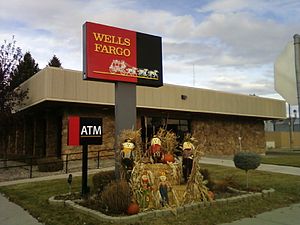 Image via Wikipedia
Image via WikipediaThe highest court in Massachusetts agreed with a lower court ruling that two home foreclosures were invalid and found that lenders Wells Fargo Bank and US Bank had failed to prove they owned the mortgages. Massachusetts’ highest court upholds the invalidation of two foreclosures in a case involving mortgage-backed securities, saying Wells Fargo and US Bank failed to prove they owned the mortgages.The case, which dealt with loans that had been pooled into mortgage-backed securities, could be another significant setback for the home lending industry.
“Since this is the first real state supreme court ruling, you can bet that an awful lot of judges will be looking at this case,” said Rebel A. Cole, a DePaul University professor of finance and real estate. “This is really going to cause a lot of problems” for mortgage lenders. The two foreclosures were made in the names of Wells Fargo and US Bank. Neither of the banks, however, had written the mortgages. Instead, they were acting as trustees, or financial caretakers, for pools of loans made and serviced by other lenders.
The principles underlying the ruling by the Supreme Judicial Court in Boston may apply in other states, including California, said Walter H. Hackett, a Walnut, Calif., attorney who has represented aggrieved homeowners in mortgage cases.
Such rulings could make it easier for distressed borrowers to obtain loan modifications while mortgage ownership issues are sorted out, Hackett said. But he cautioned homeowners not to interpret the case as a “free house” ruling absolving delinquent borrowers of their debts.
The American Securitization Forum, a trade group for the mortgage securities industry, said the problems with the two mortgages in the case involved improper paperwork but not flawed procedures and suggested the decision would not have widespread effects.
A spokeswoman for US Bank’s parent company, US Bancorp, said the court’s decision wouldn’t affect the company’s bottom line because the firm was only the trustee for the pool of loans at issue, not the owner of the mortgage. Both banks said that as trustees they were acting only on behalf of the mortgage-servicing firms in foreclosing on the loans.
The Massachusetts ruling came months after the mortgage industry was rocked by disclosures of widespread “robo-signing” — the practice at big banks of having employees certify in court to facts underlying foreclosures without taking the time to read the supporting paperwork.
Related articles
- Massachusetts Ruling Slams Bank Foreclosure Practices (dailyfinance.com)
- Banks lose key foreclosure ruling in top Massachusetts court (reuters.com)
- New US foreclosure court trouble (bbc.co.uk)

